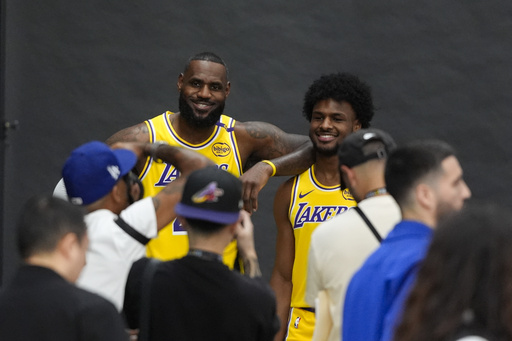
LeBron James stood on the basketball court, side by side with his son Bronny, both sporting matching Los Angeles Lakers jerseys adorned with “James” and “James Jr.” prominently displayed in purple letters.
LeBron reflected on the surreal experience, saying, “It was like the matrix or something. It just didn’t feel real.”
The Lakers fulfilled LeBron’s long-standing aspiration of playing with his son when they selected Bronny as the 55th overall pick in June, marking the historic moment when the father-son duo played together in a preseason game on October 6.
Lakers general manager Rob Pelinka described the selection as “magical,” but it also sparked debate regarding whether Bronny would have received such an opportunity were it not for his father’s status as one of the greatest players in NBA history. While the excitement around the James family was palpable, discussions about nepotism and the influence of powerful figures in sports resurfaced, revealing the ongoing stigma surrounding children following in their parent’s footsteps.
“There’s always going to be people who are saying that things are nepotism,” stated Alice Leppert, an associate professor at Ursinus College. She noted that skepticism often arises from a desire to believe in a merit-based system, where success is achieved through talent rather than connections.
“In general, we don’t live in a meritocracy,” Leppert added. “We want to live in a meritocracy, and that’s why we get these sorts of debates.”
For generations, children from affluent and influential families have inherited advantages that pave the way for their success across various sectors, including Hollywood, politics, and sports, fueling ongoing discourse about fairness in opportunity.
Critics of nepotism argue that individuals without similar access to resources, such as elite training facilities or industry connections, face severe disadvantages when it comes to achieving success in sports or entertainment.
However, some are questioning why debate about this practice persists. Former ESPN NBA insider Adrian Wojnarowski remarked that nepotism is widespread in the NBA, with many players, coaches, and team executives connected by family ties. “I don’t want to hear it all of a sudden because Bronny James’ father plays for the Lakers. It is rampant in this league,” he asserted.
Throughout NBA history, approximately 100 instances exist where children of former players have entered the league after their fathers retired. Notable pairs include Stephen and Dell Curry, Kobe and Joe “Jellybean” Bryant, and Bill and Luke Walton.
In baseball, Ken Griffey Sr. and Jr. played together with the Seattle Mariners, and in hockey, Gordie Howe suited up with both of his sons for the Houston Aeros and New England Whalers. The college football landscape also reveals a trend, with over 25 instances of family members sharing coaching staff roles in major schools.
David Grenardo, a law professor with a focus on sports law at the University of St. Thomas, explained that societal norms accept that owners can pass down their assets, but this acceptance dims when it shifts to athletes.
“There is discomfort with the idea of someone receiving an opportunity they didn’t earn,” Grenardo said, highlighting the eagerness for competitive fairness in sports. When an athlete perceived as less qualified secures a position, it shifts the conversation from meritocracy to political favoritism, questioning “whose kid is that?”
This anxiety is evident in discussions surrounding Bronny, whose critics argue he appeared unproven before being drafted and garnered unprecedented attention for a late second-round selection. After recovering from a cardiac arrest over a year ago, Bronny played one season at Southern California, where his statistics reflected a modest performance, averaging 4.8 points and 2.8 rebounds in six starts out of 25 games.
C. Keith Harrison, a professor specializing in sports management at the University of Central Florida, pointed out that Bronny, as a visible African American athlete, is under scrutiny concerning his access to power and privilege.
Harrison mentioned that nepotism is prevalent in sports ownership and coaching lineage, citing examples like the Buss family’s Lakers and the Harbaugh family’s football coaching heritage. He questioned why these dynamics are rarely scrutinized compared to the attention given to LeBron and Bronny.
Grenardo proposed that race may also play a role in the discussions around Bronny’s draft. “That here’s a Black man who’s one of the few Black billionaires and that’s an American. And he is using his power like others have used their power as well, but ‘I don’t like it that he now is that powerful,’” he explained.
